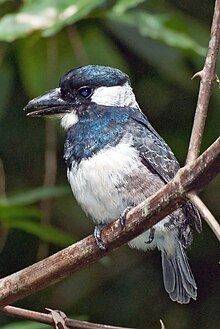Black-breasted puffbird
| Black-breasted puffbird | |
|---|---|
 |
|
| In Panama | |
| Scientific classification | |
| Kingdom: | Animalia |
| Phylum: | Chordata |
| Class: | Aves |
| Order: | Piciformes |
| Family: | Bucconidae |
| Genus: | Notharchus |
| Species: | N. pectoralis |
| Binomial name | |
|
Notharchus pectoralis (Gray, 1846) |
|
The black-breasted puffbird (Notharchus pectoralis) is a species of puffbird in the family Bucconidae. It is found in Colombia, Ecuador, and Panama.
It measures between 19 to 23 cm (7.5–9.1 in) in length and weighing around 60 to 69 g (2.1–2.4 oz). The plumage is mostly glossy blue-black, with a white collar, cheeks, throat and belly and a blue-black breast band and black tail. The heavy bill is black, as are the feet, and the iris of the eye is dark brown or red. The two sexes are the same, and the plumage of juvenile birds hasn't been described.
Its natural habitats are moist lowland rainforests from sea-level to 1,000 m (3,300 ft). It is seldom found near forest edges, and is more restricted to forests than its close relatives, but is often found near running water. The species is usually uncommon, but may be overlooked frequently due to its habit of remaining motionless for hours. It is assumed to be non-migratory. It is usually found in high foliage in the canopy, but will descent to the forest floor to pursue prey flushed by army ants, and even follow swarms of them.
The Black-fronted puffbird takes a range of prey species, including centipedes and millipedes, scorpions, spiders, cockroaches, praying mantises, grasshoppers, beetles and lizards. It hunts by watching for prey at a perch before diving down to take it, then returning to the perch to beat the prey prior to eating it.
Little is known about its breeding. Both parents excavate the nesting burrow in the arboreal termitariums. Three eggs are laid, and both parents incubate the eggs.
...
Wikipedia

